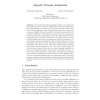Free Online Productivity Tools
i2Speak
i2Symbol
i2OCR
iTex2Img
iWeb2Print
iWeb2Shot
i2Type
iPdf2Split
iPdf2Merge
i2Bopomofo
i2Arabic
i2Style
i2Image
i2PDF
iLatex2Rtf
Sci2ools
255
Voted
DAGM
2011
Springer
2011
Springer
Agnostic Domain Adaptation
The supervised learning paradigm assumes in general that both training and test data are sampled from the same distribution. When this assumption is violated, we are in the setting of transfer learning or domain adaptation: Here, training data from a source domain, aim to learn a classifier which performs well on a target domain governed by a different distribution. We pursue an agnostic approach, assuming no information about the shift between source and target distributions but relying exclusively on unlabeled data from the target domain. Previous works [2] suggest that feature representations, which are invariant to domain change, increases generalization. Extending these ideas, we prove a generalization bound for domain adaptation that identifies the transfer mechanism: what matters is how much learnt classier itself is invariant, while feature representations may vary. Our bound is much tighter for rich hypothesis classes, which may only contain invariant classifier, but can n...
Related Content
| Added | 18 Dec 2011 |
| Updated | 20 Feb 2012 |
| Type | Journal |
| Year | 2011 |
| Where | DAGM |
| Authors | Alexander Vezhnevets, Joachim M. Buhmann |
Comments (0)




